Find the best towel material for your needs. Explore material types, pros, cons, and expert tips to make the perfect choice.
Introduction
Towels are an essential part of our everyday lives. We use them to dry ourselves after a shower or bath, to clean up spills, and to protect our furniture from dust and dirt. But there is an important question that what is the best towel material which should be considered while purchasing a towel?
Towels are a part of our daily lives that often go unnoticed until we reach for them. However, these unassuming pieces of fabric can significantly influence our comfort and well-being. The choice of towel material is crucial, as it impacts how well a towel performs its primary function - drying.
In this extensive guide, we will delve into the world of towel materials, exploring their unique attributes, benefits, and helping you make an informed choice to pick the best towel material for your specific needs.
What is The Best Towel Material for Your Needs
The best towel material for you will depend on your individual needs and preferences. Here are some factors to consider when choosing the right towel material:
- Absorbency: How important is it to you that your towels absorb water quickly? If you live in a humid climate or if you frequently use your towels for sports or travel, then you will want towels that are highly absorbent.
- Durability: How long do you want your towels to last? If you are willing to spend a little more money, then you can get towels that are made from more durable materials, such as cotton or linen.
- Price: How much are you willing to spend on towels? Cotton towels are the most affordable option, while bamboo and linen towels can be more expensive.
- Personal preference: Some people prefer soft, fluffy towels, while others prefer towels that are more absorbent. Ultimately, the best way to choose the best towel material for you is to try out different materials and see what you like best.
Why Towel Material Matters
Towels, those everyday essentials, quietly perform a significant role in our lives. From the moment you step out of a relaxing shower to drying your hands in the kitchen, towels provide comfort and functionality. Yet, have you ever pondered the material from which your towels are crafted? The type of towel material you choose can significantly impact your daily comfort, the longevity of your towels, and even your ecological footprint.
Towels are more than just functional items; they are daily essentials that offer comfort and utility. The quest for the best towel material is a common pursuit, as we all want our towels to provide the utmost satisfaction. The material from which a towel is made matters more than you might think. Let's begin by understanding why towel material is essential.
Understanding Different Towel Materials
The choice of the best towel material depends on your specific needs and preferences. Each towel material has its unique qualities, making it suitable for different situations. Here are some of the most popular towel materials and their pros and cons:
Cotton Towels: The Timeless Classic
- Pros: Soft, absorbent, durable, affordable.
- Cons: Can be heavy when wet, may shrink after washing.
Cotton is the most common and most frequently used material for making towels. It is soft, absorbent, and durable. Cotton towels are also relatively inexpensive. However, cotton towels can be heavy when wet and may shrink after washing.
If softness and comfort are at the top of your list, then cotton towels are best towel material for you. You may find that cotton towels offer the best experience. Their plush and gentle texture is perfect for wrapping yourself in warmth and luxury after a shower or bath.
Cotton towels are available in a variety of weights, from lightweight to heavyweight. The weight of the towel will affect its absorbency and durability. Lightweight towels are more absorbent, but they may not be as durable as heavyweight towels. Heavyweight towels are more durable, but they may not be as absorbent as lightweight towels.
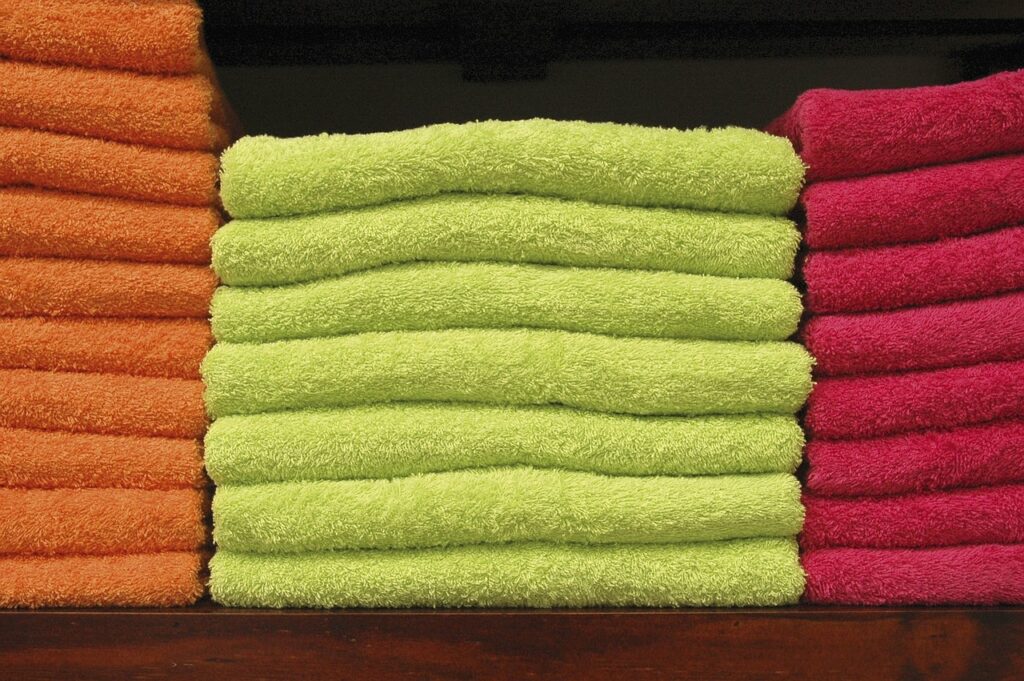
The thread count of a cotton towel is also important. (The number of threads per square inch of fabric is known thread count). A higher thread count means that the towel will be softer and more absorbent. However, a higher thread count also means that the towel will be more expensive.
Cotton towels are a time-honored favorite, cherished for their exceptional softness, high absorbency, and overall comfort. When you wrap yourself in a cotton towel after a bath or shower, you experience a level of coziness that's hard to replicate.
Cotton towels come in various types, including Egyptian and Turkish cotton, each known for its distinct qualities and hence considered as best towel materials. Egyptian cotton, for instance, is renowned for its long fibers, resulting in a smoother and more luxurious feel. Turkish cotton, on the other hand, is prized for its quick-drying capabilities.
Microfiber Towels: The Modern Marvel
- Pros: Very absorbent, dries quickly, lightweight and compact.
- Cons: Can be rough on the skin, not as durable as cotton.
Microfiber is a synthetic fiber that is very absorbent and dries quickly. Microfiber towels are often used for sports and travel because they are lightweight and compact. However, microfiber towels can be rough on the skin and may not be as durable as cotton towels.
Microfiber towels are made from tiny fibers that are much smaller than cotton fibers. This makes them very absorbent, as they can trap more water molecules than cotton fibers. Microfiber towels also dry quickly, as the water can easily evaporate from the small fibers.
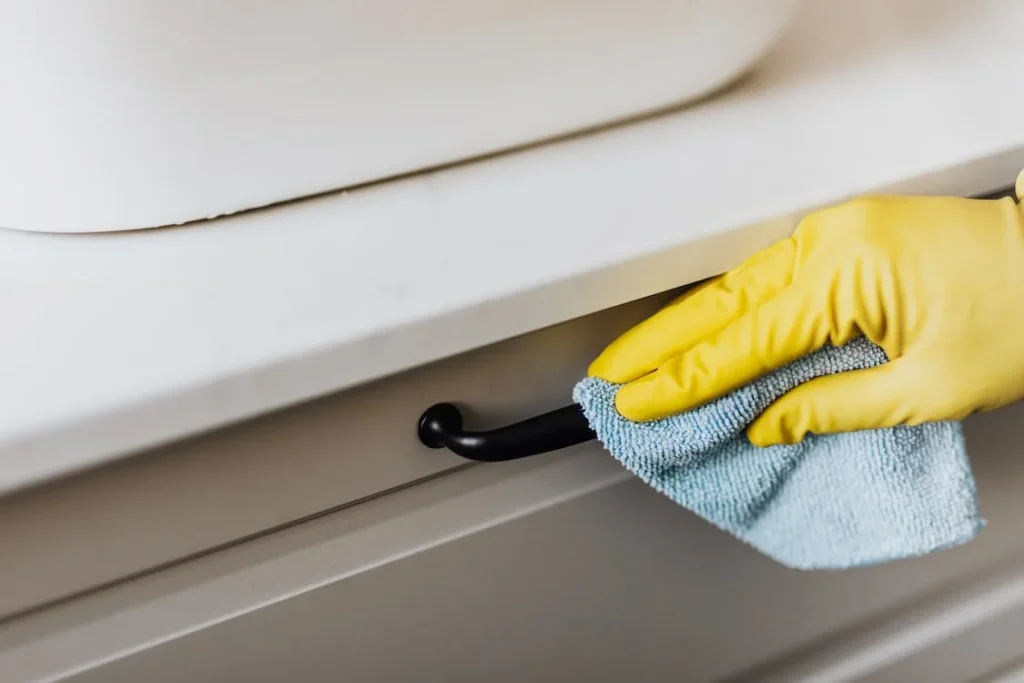
Microfiber towels are a popular choice as a best towel material for many people because of their convenience and performance. However, microfiber towels can be rough on the skin. This is because the small fibers can scratch the skin. Microfiber towels are also not as durable as cotton towels. They can be easily damaged by heat, chemicals, and abrasion.
Microfiber towels have surged in popularity in recent years due to their impressive ability to absorb moisture quickly. These towels are made from synthetic materials, typically a blend of polyester and polyamide. What sets microfiber apart is its incredibly fine fibers, which are much thinner than those of natural cotton.
The fine fibers in microfiber towels create a vast surface area, allowing them to absorb water rapidly. This property makes them ideal for use in the gym, during sports activities, or for travelers looking for compact and efficient towels. Microfiber towels are also known for their lightweight and easy-to-carry design.
Read more on microfiber towel.
Bamboo Towels: Sustainable Luxury
- Pros: Soft, absorbent, hypoallergenic, anti-bacterial, sustainable.
- Cons: More expensive than cotton, may not be as durable.
Bamboo is a fast-growing, sustainable material that is also soft and absorbent. Bamboo towels are often touted as being hypoallergenic and anti-bacterial. Bamboo towels are also more resistant to mold and mildew than cotton towels. However, they can be a little bit more expensive than the cotton towels.
Bamboo towels are made from bamboo fibers that have been processed to make them soft and absorbent. Bamboo fibers are naturally anti-bacterial and hypoallergenic, making them a best towel material for people with allergies or sensitive skin. Bamboo towels are also more resistant to mold and mildew than cotton towels, making them a good choice for humid climates.
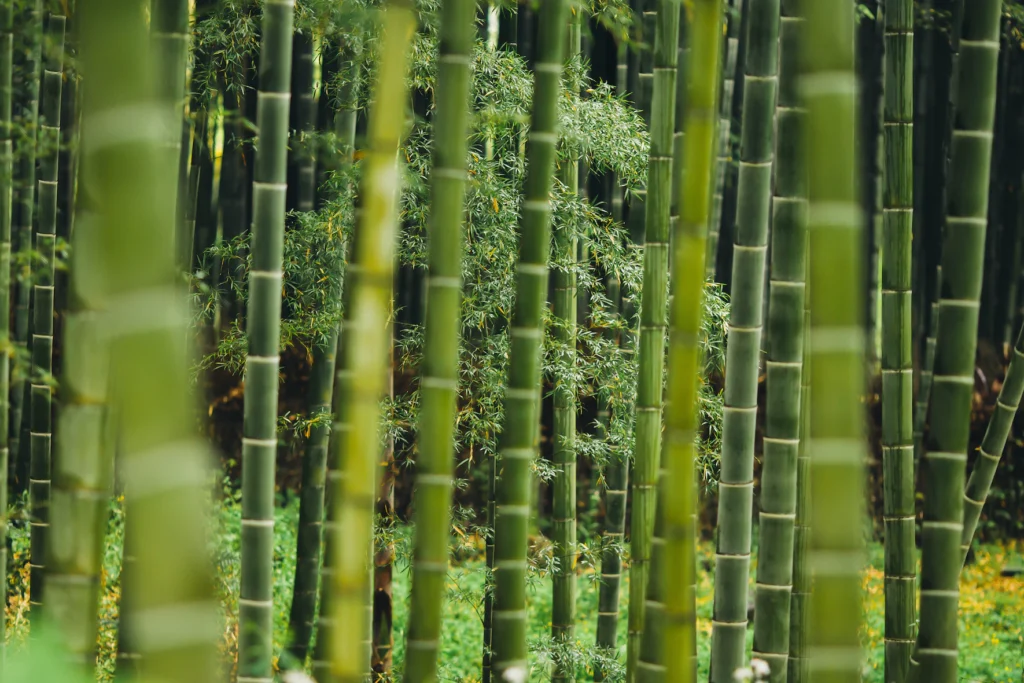
Bamboo towels are a more recent addition to the world of towel materials and have gained popularity for their eco-friendliness. Bamboo is a highly sustainable resource as it grows quickly and requires minimal water compared to traditional cotton farming. Towels made from bamboo fibers are not only environmentally friendly but also offer a range of benefits.
Bamboo towels are exceptionally soft and hypoallergenic, making them an excellent choice for those with sensitive skin. Additionally, bamboo has natural antimicrobial properties, which help keep your towels fresh and odor-free. If you're looking for an eco-conscious option that doesn't compromise on luxury, bamboo towels are worth considering. Eco-friendliness of bamboo makes them one of the best towel materials.
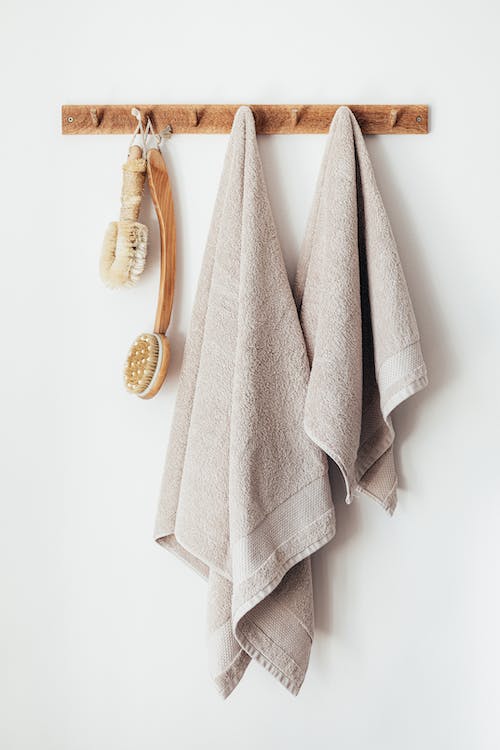
Linen Towels: The Rustic Luxury
- Pros: Strong, durable, long-lasting, naturally wrinkle-resistant.
- Cons: Expensive, can be stiff and scratchy when new.
The fibers from the flax plant are used to make linen towels. Flax fibers are very strong and durable which makes them one the best towel materials. They are also naturally wrinkle-resistant. However, linen towels can be stiff and scratchy when new.
Flax plant is known for its minimal environmental impact. Flax cultivation requires fewer pesticides and water compared to cotton farming, making linen a sustainable choice for eco-conscious individuals.
Compared to cotton towels, linen towels are usually more expensive. This is because linen is a more difficult fabric to work with. However, linen towels can last for many years, making them a good investment.
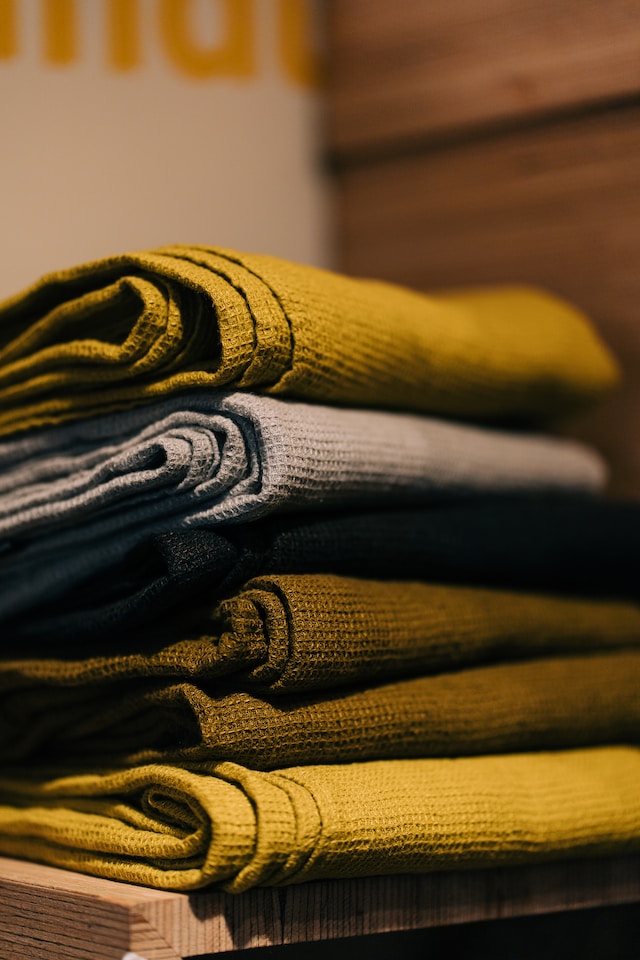
To make linen towels softer, you can wash them a few times with a fabric softener. You can tumble dry them as well but on a low temperature. With time and use, linen towels will become softer and more absorbent.
Linen towels are renowned and considered as the best towel material for their excellent absorbency. They can quickly soak up moisture, leaving your skin feeling refreshed and dry. What's more, linen has a natural ability to wick away moisture, making it a great choice for humid environments or hot summer days. After use, linen towels tend to dry rapidly, reducing the risk of musty odors and mildew.
While linen towels offer many advantages, it's essential to note that they may not be as soft as cotton towels, especially when new. However, with each wash, linen towels become softer while retaining their durability.
When choosing a best towel material, consider linen for its distinct charm and suitability for various settings. Whether you're looking for a towel to complement your beach outings or add an elegant touch to your bathroom, linen towels are a noteworthy option.
Other materials
- Tencel: A form of rayon derived from wood pulp is called Tencel. Tencel towels are soft, absorbent, and sustainable.
- Jute: Jute is a natural fiber that is strong and durable. Jute towels are often used for bath mats and other heavy-duty applications.
- Hemp: Hemp is a strong and durable natural fiber. Hemp towels are often used for bath mats and other heavy-duty applications.
- Wool: Wool is a natural fiber that is warm and absorbent. Wool towels are often used for drying hair and for keeping warm in cold weather.
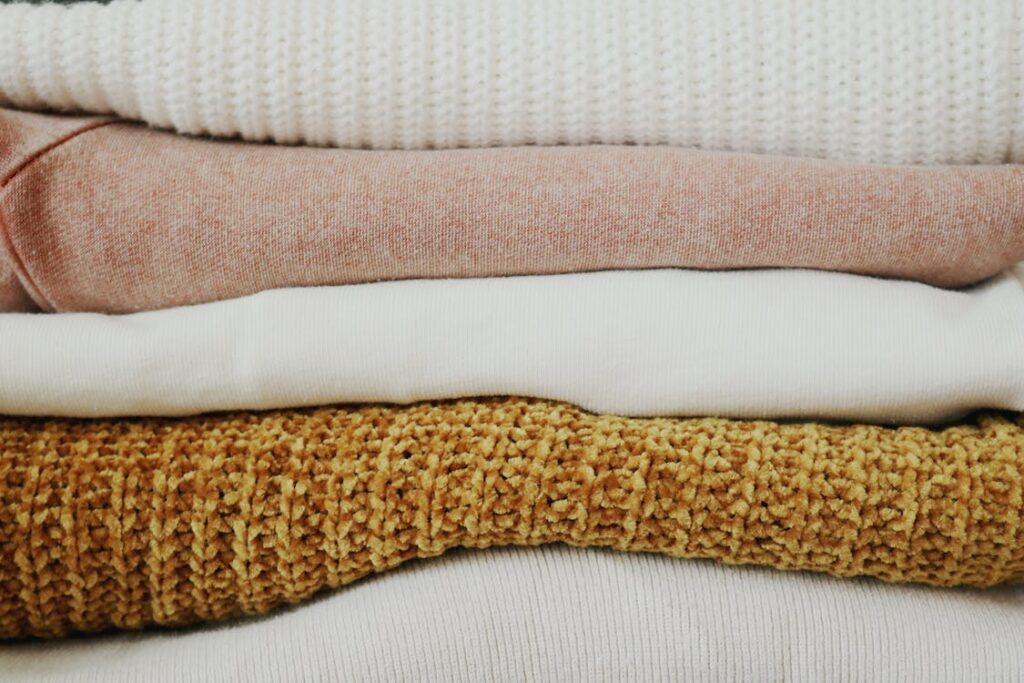
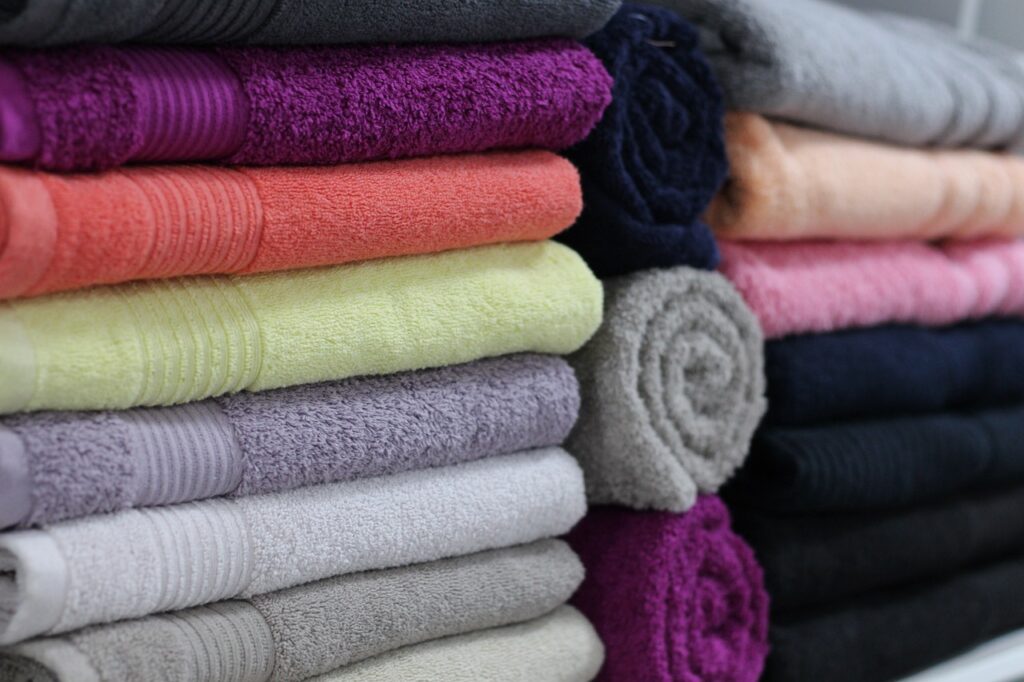
Luxurious Towels made from best towel materials.
Choosing the Right Towel Material
Selecting the best towel material depends on several factors, including your individual needs, personal preferences, intended use, and sustainability concerns. Let's explore the key considerations when choosing the perfect towel material for you.
Personal Preferences and Needs
Your choice of best towel material should align with your personal preferences and specific needs. If you prioritize softness and comfort, cotton towels, especially those made from Egyptian or Turkish cotton, would be an excellent choice. They provide a plush and cozy feeling after every use.
On the other hand, if you're frequently on the go and need a towel that dries quickly and is easy to carry, microfiber towels are a top contender. Their lightweight and compact design make them a favorite among travelers and fitness enthusiasts.
For those who are environmentally conscious and appreciate the luxurious touch, bamboo towels offer the perfect blend of sustainability and comfort.
Durability and Longevity
When investing in quality towels, durability and longevity are crucial factors to consider. Towels made from the best towel materials are considered as high-quality materials which tend to last longer and maintain their performance over time.
Cotton towels, particularly those with longer fibers like Egyptian cotton, are known for their durability. With proper care, they can withstand years of use without losing their softness and absorbency.
Microfiber towels are also durable, but it's essential to follow care instructions to maintain their performance. Avoid using fabric softeners, as they can reduce the towel's absorbency, and wash them in cold water to preserve their fine fibers.
Bamboo towels, despite their softness, are surprisingly robust. The natural antimicrobial properties of bamboo help keep the towels fresh, and they are less prone to developing odors compared to some other materials.
Absorbency and Quick Drying
The primary and basic function of any towel is to absorb the moisture effectively. The absorbency of a towel material can vary, and it's essential to choose one that meets your drying needs.
Cotton towels, especially those with a high GSM (grams per square meter) count, excel in absorbency. They can quickly soak up water, leaving you feeling comfortably dry after a shower or swim.
Microfiber towels are renowned for their exceptional absorbency. Thanks to their fine fibers, they can absorb water at a remarkable rate, making them perfect for situations where quick drying is essential.
Bamboo towels also offer excellent absorbency, and their natural antimicrobial properties help prevent the growth of bacteria, keeping them fresh between uses.
The above factors can help you decide about the best towel material so you should consider what attributes matter most to you when choosing your ideal towel material.
How to care for your towels
Choosing the best towel material is important but you should also keep good care of your towels. To keep your towels soft and absorbent, it is important to care for them properly. Here are some useful tips:
- Use a mild detergent and cold water to wash your towels.
- Avoid using fabric softener, as this can make your towels less absorbent.
- Tumble dry your towels on low heat.
- Air-dry your towels if possible.
- Do not bleach your towels.
- Spot-treat stains as soon as possible.
By following these tips, you can keep your towels looking and feeling their best for many years to come.
Maintenance Tips for Different Towel Materials
Proper care is essential to ensure your towels remain soft, absorbent, and long-lasting, regardless of the material. Here are some maintenance tips for different towel materials:
Cotton Towels
Cotton towels are beloved for their softness and durability. To keep your cotton towels in top condition, follow these maintenance tips:
- Washing Instructions: Wash cotton towels in warm water using a mild detergent. Avoid using bleach or harsh chemicals, as they can damage the fibers and reduce absorbency.
- Fabric Softeners: Avoid using fabric softeners with cotton towels. While fabric softeners can make your towels feel softer temporarily, they can also leave a residue that reduces absorbency over time.
- Drying: When it comes to drying, use a low to medium heat setting in the dryer. High heat can weaken the cotton fibers and affect the towel's longevity. Remove your towels promptly from the dryer to prevent wrinkles.
- Avoid Overloading: Don't overload your washing machine with too many towels at once. This can lead to inadequate cleaning and hinder proper drying.
- Separate Towels: To prevent lint transfer, wash your towels separately from other fabrics like clothing.
Microfiber Towels
Microfiber towels are known for their quick-drying properties and high absorbency. Proper care ensures they remain effective:
- Cold Water Wash: Machine-wash microfiber towels in cold water to maintain the integrity of the fine fibers. Avoid using bleach or fabric softeners, as they can diminish absorbency.
- Drying: Opt for air drying or use the lowest heat setting in the dryer. High heat can damage the synthetic fibers. If using a dryer, avoid fabric softener sheets.
- Avoid Fabric Softeners: Fabric softeners can leave a residue on microfiber towels, reducing their ability to absorb moisture effectively.
- Separate Loads: Wash microfiber towels separately from cotton or lint-producing fabrics to prevent lint transfer.
Bamboo Towels
Bamboo towels are prized for their eco-friendliness and luxurious feel. Here's how to care for them:
- Cold Water Wash: Use cold water and a mild detergent when washing bamboo towels. Avoid bleach and fabric softeners, as they can harm the bamboo fibers.
- Gentle Cycle: Opt for a gentle cycle on your washing machine to protect the delicate bamboo fibers.
- Drying: Bamboo towels can be tumble-dried on low heat, but it's best to air dry them to maintain their softness and absorbency.
- Avoid Overloading: Don't overload the washing machine or dryer when laundering bamboo towels, as this can lead to inadequate cleaning and drying.
- Storage: Store your bamboo towels in a cool, dry place. Prolonged exposure to direct sunlight must be avoided to prevent fading.
Now that we've explored maintenance tips for different towel materials, let's move on to comparing these materials for various uses.
Comparing Towel Materials for Different Uses
Towel materials are not one-size-fits-all. They excel in different situations and serve specific needs. Let's compare them for various uses to help you make informed choices:
Bath Towels vs. Hand Towels
Bath Towels
- Cotton Bath Towels: These are ideal for wrapping yourself in comfort after a bath or shower. They offer exceptional softness and high absorbency, ensuring you dry off quickly and comfortably.
- Microfiber Bath Towels: Quick-drying and suitable for active individuals. Microfiber bath towels are lightweight and perfect for the gym or travel.
Hand Towels
- Cotton Hand Towels: Soft and absorbent, cotton hand towels are great for hand drying in the bathroom or kitchen. They come in various sizes, making them versatile for different tasks.
- Microfiber Hand Towels: Fast-drying and convenient for daily use. Microfiber hand towels are excellent for busy households where quick drying is essential.
Beach Towels vs. Kitchen Towels
Beach Towels
- Cotton Beach Towels: Large and highly absorbent, cotton beach towels are perfect for a day by the water. They provide a comfortable surface for sunbathing and drying off after a swim.
- Microfiber Beach Towels: Compact and quick-drying, microfiber beach towels are ideal for travelers and beachgoers. They don't take up too much space in your beach bag.
Kitchen Towels
- Cotton Kitchen Towels: Absorbent and versatile, cotton kitchen towels are essential for any kitchen. They are perfect for drying dishes, wiping countertops, and handling hot pots and pans.
- Microfiber Kitchen Towels: Quick-drying and excellent for wiping surfaces, microfiber kitchen towels are highly effective for keeping your kitchen clean and dry.
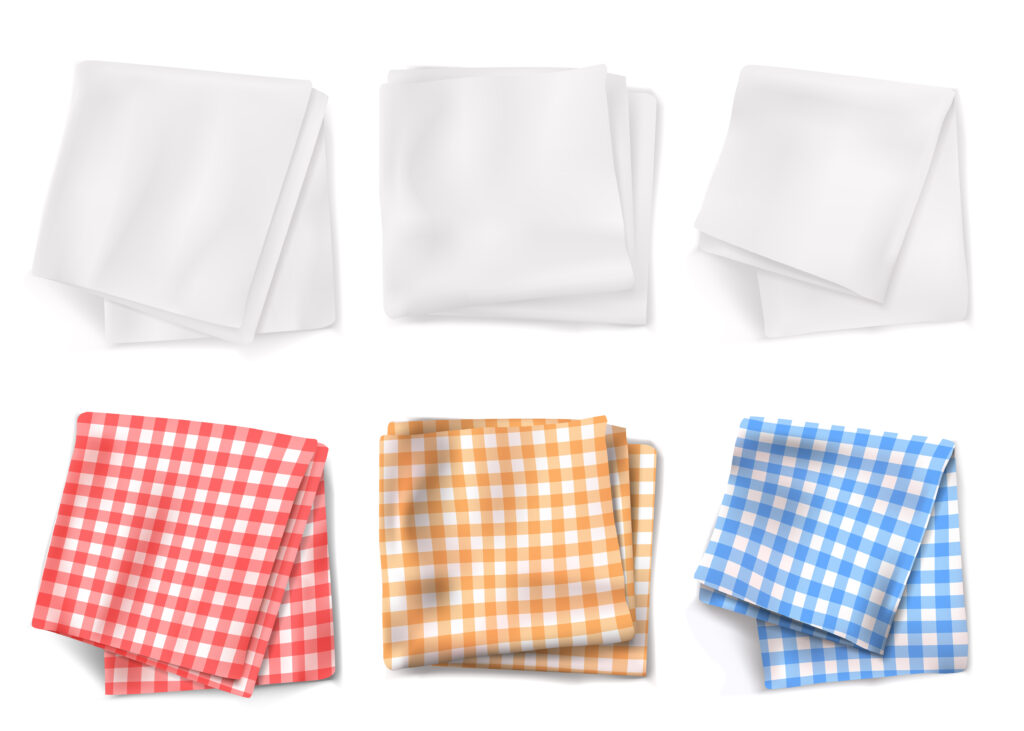
Making Your Decision: Factors to Consider
As you embark on the journey to find the best towel material, it's essential to consider various factors that influence your choice. Each material has its strengths, and the decision largely depends on your priorities. Here are some key considerations to help you make an informed choice:
1. Softness and Comfort: If softness and comfort are at the top of your list, you may find that cotton towels offer the best experience so they may be considered as best towel material for your needs. Their plush and gentle texture is perfect for wrapping yourself in warmth and luxury after a shower or bath.
2. Absorbency: For those who value quick drying and exceptional moisture absorption, microfiber towels can be your top pick as a best towel material. They excel in wicking away moisture swiftly, leaving your skin dry and refreshed.
3. Sustainability: If you're environmentally conscious and prefer sustainable options, then bamboo towels are best towel material for you. Bamboo is a renewable resource that grows rapidly and requires minimal water compared to traditional cotton farming.
4. Unique Texture: Seeking a distinctive touch and rustic charm? Look no further than linen towels. Their slightly rougher texture adds character and a sense of indulgence to your towel experience.
5. Durability: When durability is a primary concern, both cotton and linen towels shine as the best towel materials. Cotton towels are known for their longevity, and linen towels become even more durable with time.
6. Activities and Lifestyle: Consider your lifestyle and the specific activities you engage in. Are you a frequent traveler or fitness enthusiast? Microfiber towels are compact and quick-drying, making them ideal for on-the-go use.
7. Aesthetic Appeal: Your towel choice can also contribute to the aesthetics of your bathroom or beach ensemble. The natural, earthy tones of bamboo and linen towels can complement various interior styles.
8. Maintenance: Think about how much time you're willing to invest in towel care. Some materials require more delicate handling than others. While cotton towels are relatively low-maintenance, linen towels become softer with each wash.
By carefully considering these factors, you can narrow down your options and determine the best towel material for your unique preferences and needs. Remember that the "best" choice varies from person to person, and there's no one-size-fits-all answer.
Conclusion: Your Towel, Your Choice
In the quest for the best towel material, it's essential to balance practicality with personal preferences. Your towels are an integral part of your daily routine, providing comfort, functionality, and even a touch of luxury. Whether you choose the classic softness of cotton, the quick-drying efficiency of microfiber, the eco-friendliness of bamboo, or the rustic charm of linen, your decision should align with what matters most to you.
So, as you browse through the options and envision your ideal towel, remember that the choice is ultimately yours. Your towel reflects your comfort, your style, and your values. It's not just a piece of fabric; it's a part of your daily life. Choose wisely, and embrace the comfort and luxury that the best towel material brings to your world.

Conclusion: Wrapping Up Your Towel Journey
In conclusion, the choice of towel material is not just a matter of personal preference but also one of practicality. Your towels impact your daily comfort, whether you're wrapping up after a shower or drying dishes in the kitchen. By understanding the unique characteristics of different towel materials and considering your specific needs, you can make an informed decision.
In summary, cotton towels provide classic comfort and durability, microfiber towels offer quick-drying convenience, and bamboo towels combine luxury with eco-friendliness. Your choice ultimately depends on your priorities, whether it's softness, absorbency, or sustainability.
Ultimately, the best towel material for you is the one that you like the best. Consider your needs and preferences, such as absorbency, durability, price, and personal preference, when making your decision. So, the next time you reach for that towel, remember that it's not just a piece of fabric—it's a reflection of your preferences and priorities.
- Recommendation:
- If you are still not sure which towel material is right for you, I recommend trying out a few different materials and seeing what you like best. You can also ask your friends and family for recommendations.
- Thank you:
- Thank you for reading this post! I hope it has helped you to learn more about the different towel materials available and how to choose the best towel material for you.
FAQs About the Best Towel Material
Now, let's address some frequently asked questions about the best towel materials:
Are microfiber towels better than cotton towels?
Microfiber towels are excellent for specific purposes like quick drying and compactness, making them suitable for travel and active lifestyles. However, cotton towels are preferred for their softness and overall comfort, especially for daily use at home.
How do I choose the best towel material?
Consider factors like softness, absorbency, and durability based on your preferences and needs.
Are bamboo towels eco-friendly?
Yes, bamboo is a sustainable resource, making bamboo towels an environmentally friendly choice.
Can microfiber towels be used for cleaning purposes?
Absolutely! Microfiber towels are highly effective for cleaning due to their trapping capabilities.
How long should towels last before replacing them?
On average, towels should be replaced every 2-3 years, depending on usage and care. Over time, towels may lose their absorbency and softness, indicating the need for replacement.
Which is softer, cotton or microfiber towels?
Cotton towels are known for their softness, while microfiber towels excel in quick drying.
How can I make my towels last longer?
To extend the lifespan of your towels, follow care instructions specific to the material. Avoid using fabric softeners, use cold water for washing, and adhere to recommended drying settings. Proper storage in a cool, dry place also helps prevent deterioration.
What are the benefits of bamboo towels for the environment?
Bamboo is a highly sustainable resource, growing quickly and requiring minimal water compared to traditional cotton farming. Choosing bamboo towels contributes to environmental conservation, making them an eco-conscious choice.
Can I use microfiber towels for cleaning purposes?
Absolutely! Microfiber towels are highly effective for cleaning due to their exceptional absorbency and ability to trap dirt and moisture. They are commonly used for cleaning surfaces, glass, and various household tasks.
What is the best material for a towel?
The best towel material for you depends on your needs & preferences. So think carefully and decide what is the best material for a towel among Cotton, Bamboo, Microfiber, Linen or some other materials like Tencel, Jute, Hemp or Wool.
Related Posts:
1. Sanitation Towel Guide 101: An Amazing Cleaning Companion
2. Towel Warmer for Bathroom: Luxurious Comfort for 2023

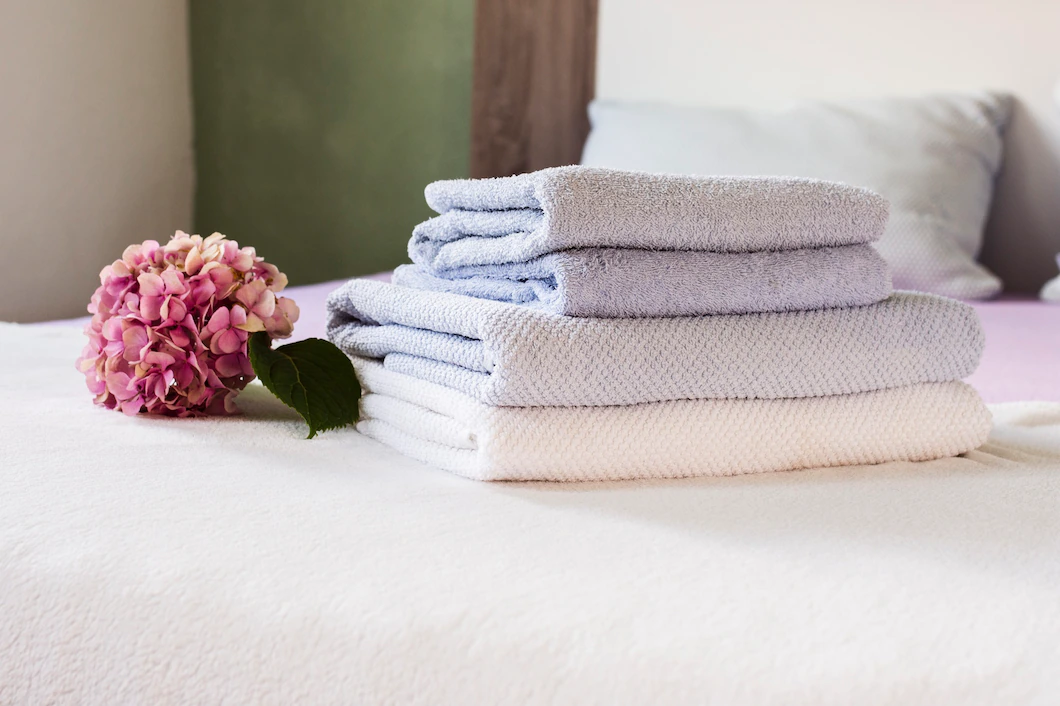
5 thoughts on “Best Towel Material Guide 2024: Types, Pros & Cons”
Comments are closed.